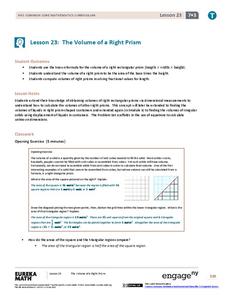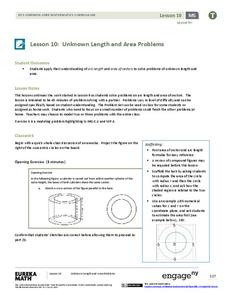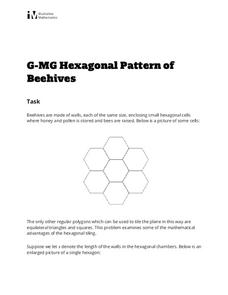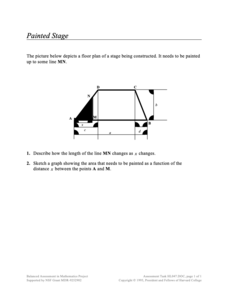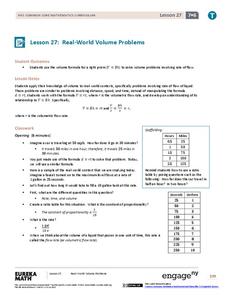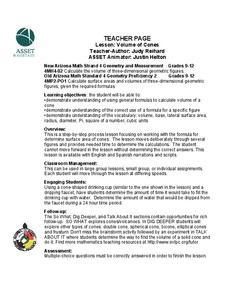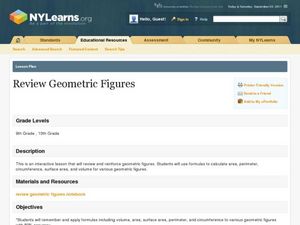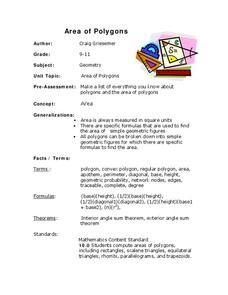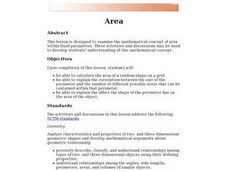EngageNY
The Volume of a Right Prism
Does the volume formula work even if the measurements are not whole numbers? Class members work simple problems to find that the formula (area of the base) × (height) works for all prisms, independent of measurements and shape.
Radford University
Fun with Solids
Geometry is all around us—if we're only willing to look. The final three activities of the Fun with Solids unit continue work on surface area and volume. For lesson three, scholars investigate the formulas for spheres and solve a problem...
Inside Mathematics
Rugs
The class braids irrational numbers, Pythagoras, and perimeter together. The mini-assessment requires scholars to use irrational numbers and the Pythagorean Theorem to find perimeters of rugs. The rugs are rectangular, triangular,...
Illustrative Mathematics
Logistic Growth Model, Abstract Version
Here learners get to flex some serious algebraic muscles through an investigation of logistic growth. The properties of the constant terms in the logistic growth formula are unraveled in a short but content-dense...
EngageNY
Unknown Length and Area Problems
What is an annulus? Pupils first learn about how to create an annulus, then consider how to find the area of such shapes. They then complete a problem set on arc length and areas of sectors.
Illustrative Mathematics
Hexagonal Pattern of Beehives
Young geometers and biologists investigate the math of nature in an activity that is just the bee's knees. Participants will study the tessellations of hexagons in a beehive, along with the natural rationale behind the specific shape....
Utah Education Network (UEN)
Geometry
Shape one's understanding of geometry using the resource. The sixth of seven chapters in 6th Grade Math focuses on geometry principles. Future mathematicians learn to find the area of parallelograms, trapezoids, triangles, and other...
Concord Consortium
Painted Stage
Find the area as it slides. Pupils derive an equation to find the painted area of a section of a trapezoidal-shaped stage The section depends upon the sliding distance the edge of the painted section is from a vertex of the trapezoid....
EngageNY
Real-World Volume Problems
How long does it take to fill a typical swimming pool? Prepare your pupils to answer similar questions using the 28th lesson in the 29-part module. The engaging lesson asks individuals to solve problems connected to the flow rate. All...
CK-12 Foundation
Points that Partition Line Segments: Cutting a Log
Teach ratios of line segments using an interactive approach. Scholars examine a line segment in the shape of a log and use their knowledge of ratios to divide it into various partitions. As an introductory lesson, the segment has a...
Radford University
Ping Pong Packing
Bounce off some ideas to reduce the amount of wasted space. Teams work together to determine the best size and shape of container to package a large order of ping pong balls. Groups are to design the container to reduce the amount of...
Curated OER
Learning About Volume
Learners explore the concept of volume. They develop formulas for volume of prisms. Then use their formulas to find missing dimensions of various prisms such as height, length, width, radius, and diameter.
Curated OER
Cylinder Volume Lesson Plan
Tenth graders define the formula for cylinders and use it to solve real world problems. In this geometry lesson, pupils differentiate between area, perimeters, 2D shapes, 3D shapes, and volume of prisms, cylinders and spheres. They...
Curated OER
Volume of Cones
Students identify the volume of cones and pyramids. In this geometry lesson, students derive the formula for cones and pyramids. They calculate the volume of cones and other three dimensional shapes.
Curated OER
Review Geometric Figures
Youngsters review different geometric figures and shapes. In this geometry lesson, pupils use formulas to calculate area, perimeter, circumference and volume of geometric shapes. They calculate the surface area also.
Curated OER
Volume of Rectangular Prism and Cylinder
Learners calculate volume of rectangular prisms and cylinders. They draw and label figures to use the formulas to calculate the volume of rectangular prisms. In addition, they use objects to calculate volume in a hands on activity.
Curated OER
Countdown Challenge: Platonic Solids - Part I
Use a Platonic solids worksheet to record the number of faces, edges, and vertices of five polyhedra whose faces, edges, and vertices are all identical. For each figure, learners write a proof of Euler's formula (F+V=E+2). They create a...
Curated OER
Area of Polygons
Students engage in a lesson plan that is about the concept of polygons and focuses upon finding the area. They use formulas provided in the lesson plan in order to solve problems given by the teacher for independent practice. Geometric...
Curated OER
Finding the Area and Perimeter of Polygons
Seventh graders practice finding the area and perimeter of polygons. In this polygon area instructional activity, 7th graders brainstorm shapes and take a walk to locate shapes. Students record properties of shapes and use...
Curated OER
Area Applet
Elementary math classes calculate the area of a shape and explain the correlation between the size of the perimeter and the areas that can be contained within that perimeter. They also explain the effect the shape of the perimeter has on...
Curated OER
Simple Area of a Rectangle
What is the area? Because there is only one problem here (and it is followed by a detailed explanation) use this as an all-class warm up. Cover up the bottom half until scholars have shared their own answers. They examine a rectangle...
Curated OER
Area of Rectangles and Squares
Find the area; scholars examine nine images of squares and rectangles with width, length, and units provided for each. They multiply double-digit numbers to find the area, writing it into the box provided. Because square units are...
Illustrative Mathematics
Paper Clip
With minimal setup and maximum freedom, young geometers are encouraged to think outside the box on a seemingly simple application problem. Though the task seems simple, measuring a given paper clip and finding how many 10 meters can...
Illustrative Mathematics
How Many Cells Are in the Human Body?
Investigating the large numbers of science is the task in a simple but deep activity. Given a one-sentence problem set-up and some basic assumptions, the class sets off on an open-ended investigation that really gives some...
